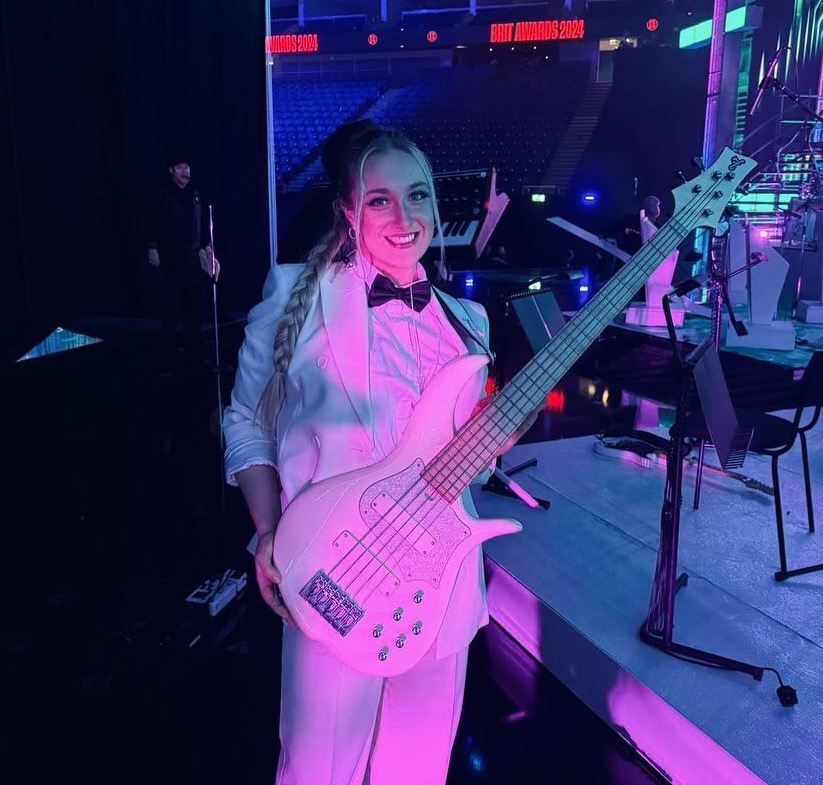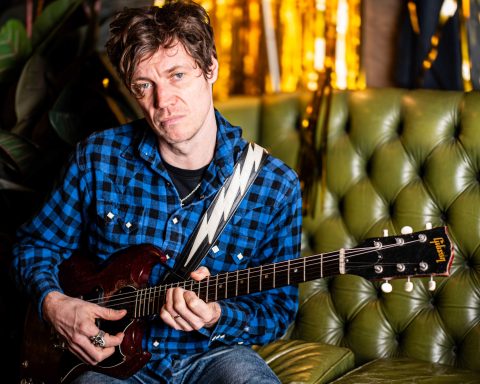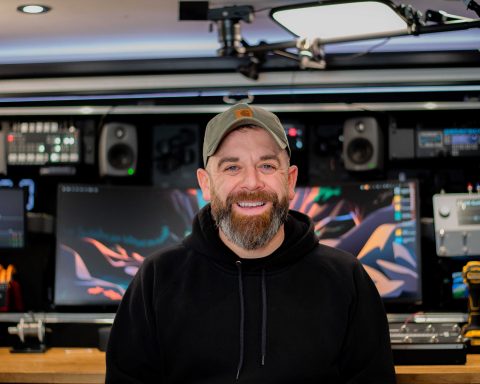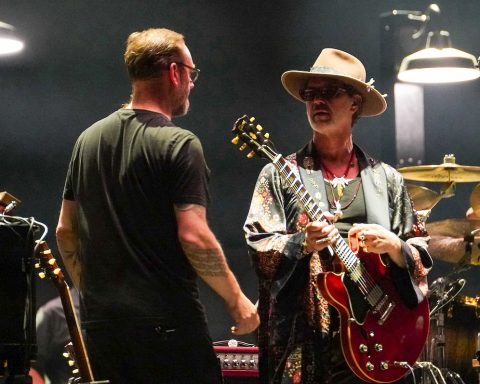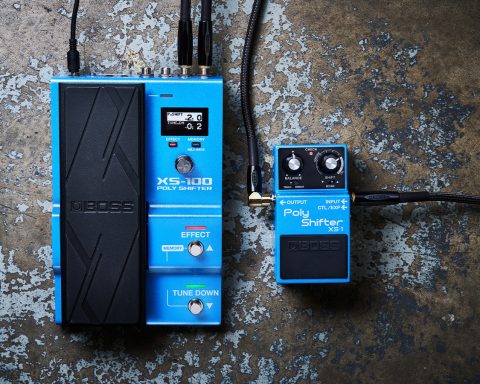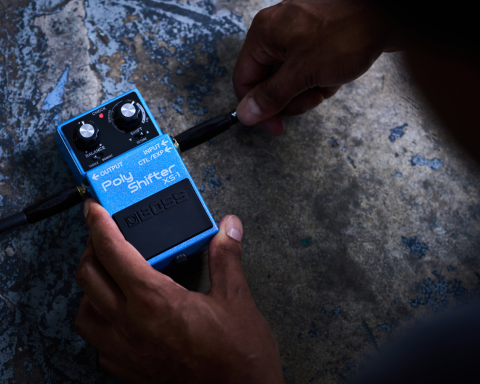Social media is a double-edged sword. On the one hand, it can distract as musicians fritter away precious time otherwise spent working on their craft. But on the other hand, it can positively inform, inspire, and connect. It may also lead to career-altering opportunities. Such was the case when Liv Thompson received an Instagram direct message inviting her to play with one of her all-time favorite artists, RAYE—the first woman to win the prestigious Brit Awards’ Songwriter of the Year.
RAYE of Light
Primo session bassist and keyboardist Liv Thompson is still buzzing after her hometown performance with record-breaking British star RAYE. The previous evening’s O2 Apollo Manchester concert was one of many knockout shows on RAYE’s current My 21st Century Blues World Tour. This UK leg ends with a sold-out appearance at London’s 20,000-capacity The O2 Arena, then it’s off to California’s Coachella festival, followed by a series of dates in South America. These days, the kind of epic gigs Thompson regularly plays are a far cry from the gritty clubs she cut her teeth in.
Gigging in a function band from age sixteen was Thompson’s sink-or-swim introduction to life as a working musician. In recent years, she has also lent her talents to The X Factor-winning girl group Little Mix, chart-topping singer-songwriter Becky Hill, and London luminary Cat Burns. But hitting the road early on to play spit-and-sawdust holiday camps and wedding venues stood Thompson in good stead. As she acknowledges: “It was the best thing to do at the time because it threw me in at the deep end.”
"It was the best thing to do at the time because it threw me in at the deep end."
A Mix of Influences
Raised on a diet of Led Zeppelin, Joy Division, and R.E.M. (courtesy of her dad’s beloved mix tapes), Thompson first picked up a bass when her mum suggested it might be a rewarding alternative to learning guitar. “I started playing bass when I was fifteen,” she reveals. “So, I suppose that’s quite late compared to many people. I fell in love with playing bass straight away. Something clicked. The first things I started playing were Iron Maiden tunes.”
Learning Iron Maiden four-stringer Steve Harris’s basslines got Thompson off to a galloping start. “Iron Maiden was challenging enough that it took time to get it down, but not so challenging that it felt too difficult to pick up,” she explains. “It makes sense musically, and you can expect where it’s going, but it was tricky enough to make me addicted to wanting to nail it.”
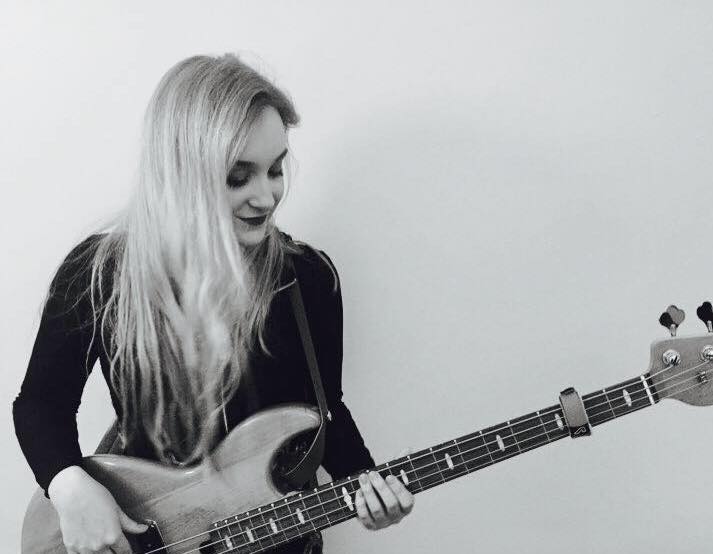
At the same time, the budding bass aficionado decided to take lessons from a school music teacher. He dutifully helped her through the Rockschool grades before recommending she spread her musical wings and put theory to the test with a local function band. “The other people in the function band were much older than me, and they’d been playing for many years,” Thompson recalls. “My first gig was in a working men’s club, which was terrifying!”
Anything Can Happen
Plunging in at the deep end, she soon discovered the first rule of the road: any situation that can happen will happen. But traveling and performing with more experienced musicians meant she learned the ropes fast. “I learned about the importance of gear from gigging, as opposed to playing in my bedroom,” Thompson emphasizes. “I quickly discovered how important it was to have the best gear that you can. When you’re out there working, you’re figuring it out and picking up a lot of tips.”
Something a Little Different
As a pop session musician, it’s impossible to predict every request that may come your way, and Thompson is often asked to come up with unusual sounds on the spot. “If you’re not entirely sure what to expect, it’s best to have everything covered,” she advises. “But you can’t carry everything with you. Otherwise, your board would be massive.”
So, what if the musical director asks for something a little different? “If I needed something unusual, I would quickly find it using a multi-effects unit,” reveals Thompson. “Then, I’d refine the sound afterward using a pedal. I would pretty much always use multi-effects alongside some other pedals like a chorus, a compressor, and maybe an envelope filter.”
"I learned about the importance of gear from gigging, as opposed to playing in my bedroom."
Gearing Up
The now-in-demand bassist is happy to reveal some of her best gear tips. “I’ve never had a BOSS pedal fail on me,” Thompson says. “I know it’s going to work, and always do what I need it to do. They’re just so consistent, which is important. Especially if you’re gigging a lot, you rely on your gear to never fail.”
One of Thompson’s longest-serving BOSS compact pedals is the TU-3 Chromatic Tuner. This industry standard guitar and bass tuner is a pedalboard mainstay, whatever the situation. “The BOSS TU-3 Chromatic Tuner has always been on my board, and it’s never faulted,” she states. “It’s the best tuner ever. It’s also handy for cutting the signal when not playing, so it’s nice and clean.”
In fact, Thompson’s BOSS TU-3 Chromatic Tuner is so reliable she’s always used the same unit. “Someone gave it to me, and it was already used when I got it,” she recalls. “Having reliable pedals and gear is super important. Sometimes, it’s a rush to get onstage and play, so you need solid equipment to plug into and be ready.”
"The BOSS TU-3 Chromatic Tuner has always been on my board, and it’s never faulted. It’s the best tuner ever."
Completing the Octave
In addition to the TU-3 Chromatic Tuner, Thompson is a big fan of the BOSS OC-5 Octave and vintage OC-2 Octave. “Before RAYE, my board was a bit different. I used the OC-2 and OC-5 a lot,” she recollects. “The OC-2 has a little more character, which is nice. But if it’s a pop gig where the sound must be super clean and precise, I’ll go with the OC-5.”
Available now, the BOSS OC-5 Octave is the most recent compact pedal of its type and features a Vintage mode that recreates the sound of the legendary analog OC-2 from 1982. “The OC-5 has been more on my board recently for pop stuff because it tracks very cleanly,” Thompson says, “but it also has a Vintage mode, which gives you the OC-2 energy if you need it. It’s great. You have that option to hark back to an OC-2 vibe.”
"The OC-5 has been more on my board recently for pop stuff because it tracks very cleanly, but it also has a Vintage mode, which gives you the OC-2 energy if you need it."
Classic Chorus and EQ
With plenty of cool vintage BOSS compact pedals out there, the bassist is always on the lookout for something unique. “I recently picked up an old BOSS CE-2B on Denmark Street in London for seventy-five quid,” she says, spotlighting the 1987 classic. “It’s amazing!” she enthuses. “I love the sound of the current CEB-3 Bass Chorus, too. I have that in my studio at home as part of my practice board. It’s gorgeous.”
Thompson doesn’t tend to use EQ and compressor pedals in large concert halls and arenas. “That tends to get taken care of by front-of-house engineers who like to control those aspects,” Thompson explains. Still, she recommends a pair of dedicated BOSS bass pedals for playing other regular venues.
“I’ve used the BOSS GEB-7 Bass Equalizer, which was useful for smaller gigs. You can dial in your sound to suit the room using those,” she clarifies. “The BOSS BC-1X Bass Comp is another handy pedal. That compressor is lovely, especially if you’re doing a mixed bag of styles and songs where you need to perform a range of different techniques. It keeps everything sounding consistent.”
Iconic and Intuitive
So, what does Thompson love about BOSS compact pedals overall, and why does she keep returning to them? “I think BOSS pedals are just so iconic,” she says. “They last a long time, and I’ve never had to worry about them breaking. They sound amazing, they’re intuitive to use, and they’re consistent across the board. Even the design of the footswitch is the best I’ve used. I mean, there’s no chance of missing it!”
"It’s important to encourage and inspire other musicians, especially if you feel there’s not equal representation."
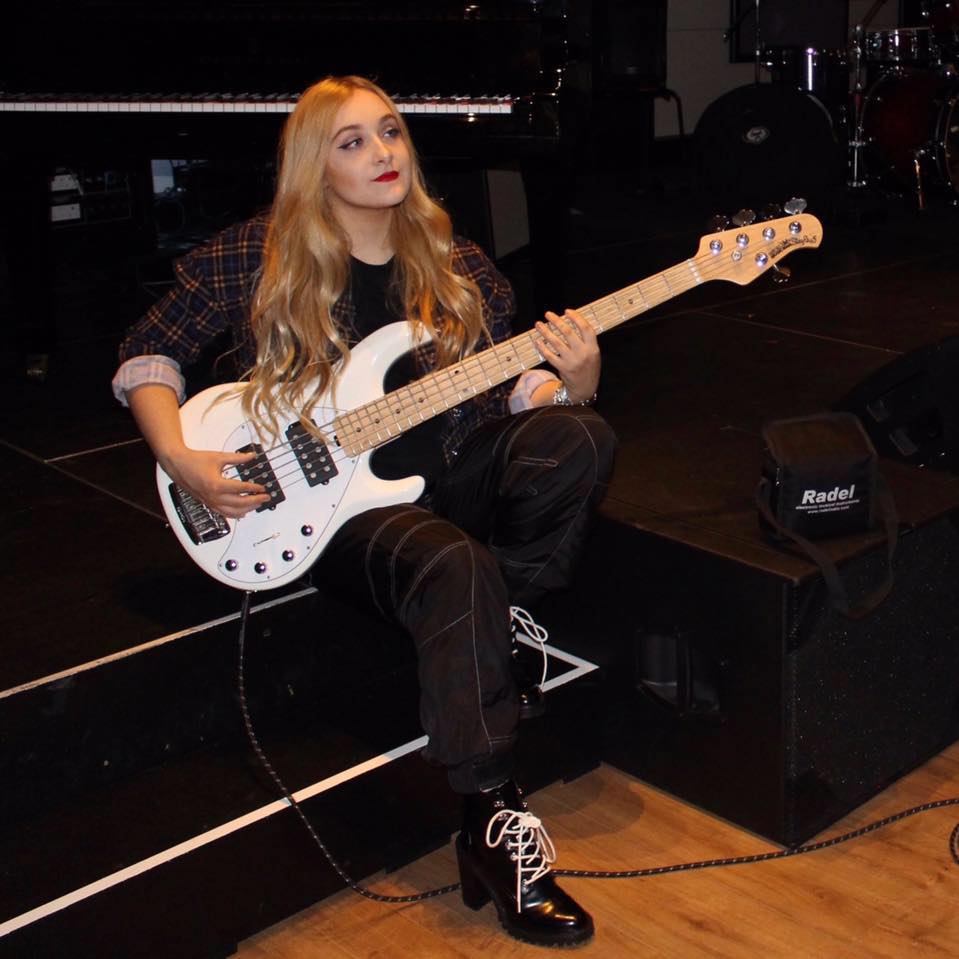
For International Women’s Day 2024, Thompson shares what this year’s “Inspire Inclusion” campaign theme means to her. “There aren’t many female session musicians,” she begins, “but I’m lucky enough to have been supported by so many people. It’s important to encourage and inspire other musicians, especially if you feel there’s not equal representation.”
In parting, Thompson passes on some advice on maintaining stable gear and a stable career. “I recommend building a reliable, consistent rig you can depend on and getting out there and playing with people you respect and who are prepared to help and encourage you.”
